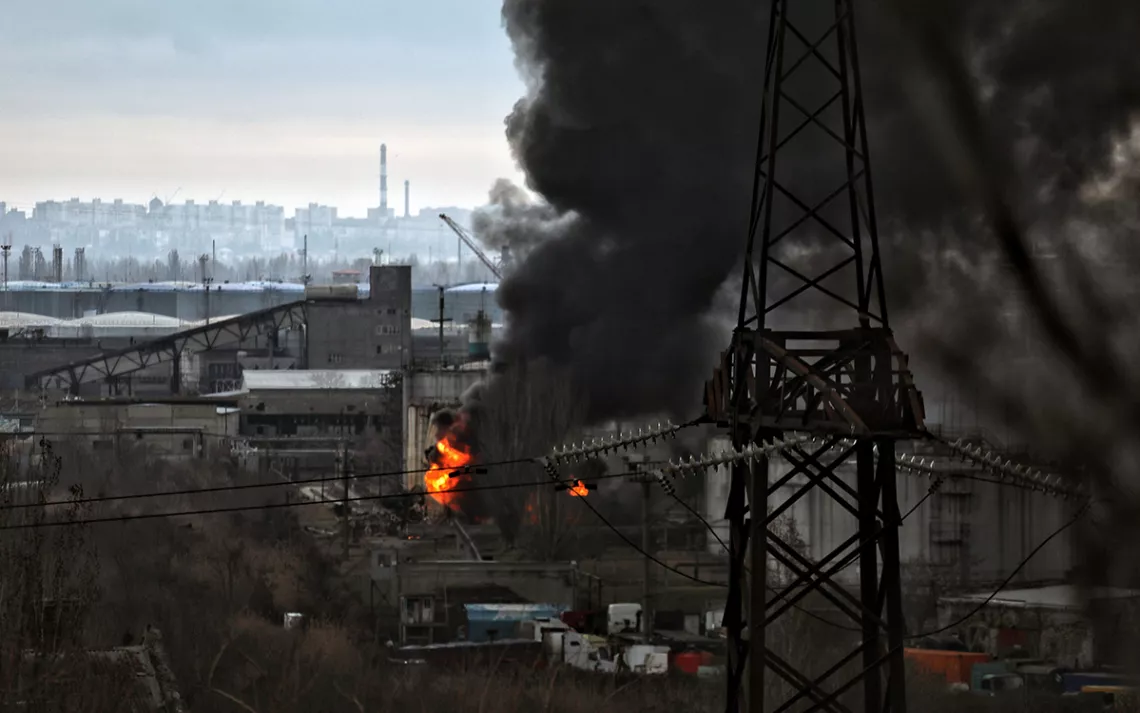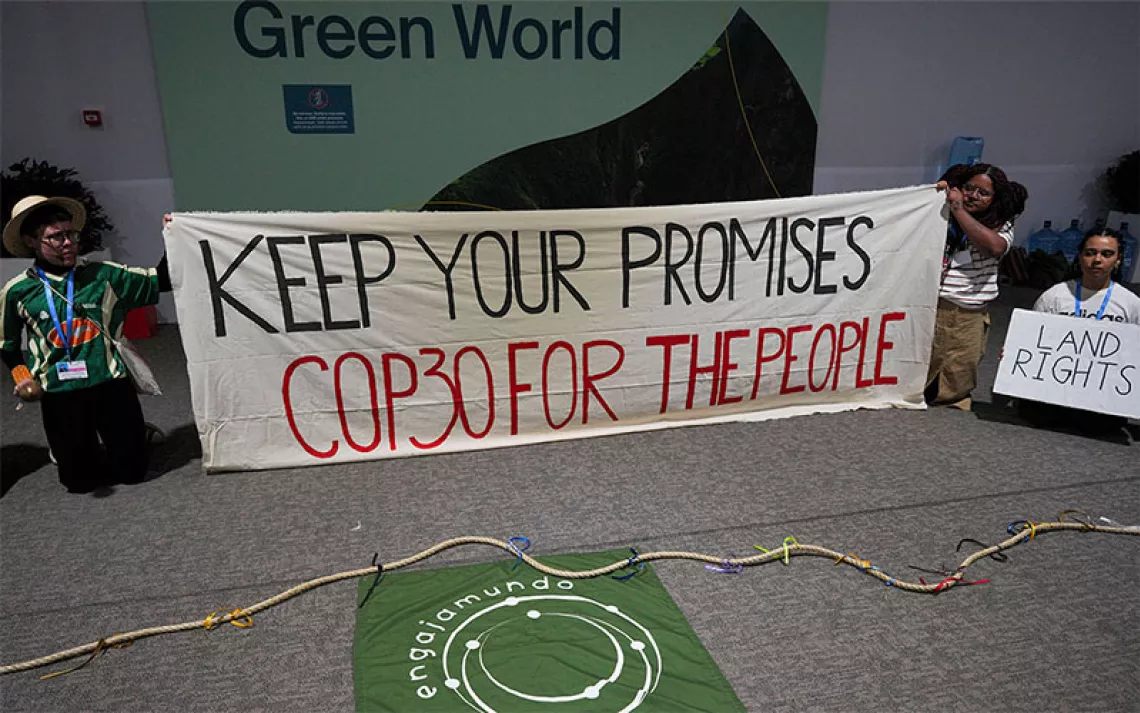The Global Climate Breakdown: The Energy Politics of the War in Ukraine
A pair of Ukrainian environmentalists discuss the impacts of Russia’s invasion—and how to rebuild the country in a sustainable fashion

A fire rages after Russian rockets hit an oil refinery and an oil depot in Odesa, southern Ukraine, on April 3, 2022. | Photo by Nina Lyashonok/Sipa via AP Images
During the past eight months, the world has grown all too familiar with the horrific human costs of Vladimir Putin's illegal invasion of Ukraine: the staggering loss of life, the mass displacement, and the deliberate destruction of civilian infrastructure and the fabric of civic life. In addition to these direct human costs, the war has also wreaked havoc on Ukraine’s environment, creating health risks that may last long after the war is concluded.
To explore the environmental effects of the war in Ukraine, I reached out to Kostiantyn Krynytskyi, the head of the Energy Department at the Centre of Environmental Initiatives (EcoAction) in Ukraine, and Olena Pavlenko, president of the Dixi Group, a Kyiv-based think tank focusing on research related to information policy, energy, and security. Olena and Kostiantyn are experts on Ukraine’s energy sector and climate initiatives and also had much to say about how the global fossil fuel economy has sustained Russia’s war effort, the weaknesses in the West’s energy sanctions regime, and how Ukraine is rethinking its own dependence on fossil fuels as it begins to plan its post-war reconstruction. Our conversation has been edited for clarity and brevity.
Steve Herz: Since the war began, your organizations have been cataloging cases of potentially dangerous environmental impacts—everything from releases of toxic waste from damaged industrial facilities to impacts on natural habitats. Can you give us a sense of what you have found?
Kostiantyn Krynytskyi: When the invasion started, we decided to reorganize ourselves to understand what we can do. And a new topic that popped out was tracking potential environmental crimes. We have an interactive map where we keep track of the damages that we see reported in the media. Currently, we have almost 500 cases, and they're divided into different categories such as livestock waste, nuclear safety risks, impacts on ecosystems, impacts on the sea and water resources, impacts on the energy infrastructure, and damage to the industrial facilities.
Our database is public. It's open. We are also sharing it with the Ministry of the Environment and other partner organizations.
The most obvious and dangerous example, of course, is the nuclear terrorism by Russia at the Zaporizhzhia nuclear power plant. For all Ukrainians, it was a very tense night at the beginning of March when Russians captured Zaporizhzhia, when we saw all this damage from the missiles flying. Now, currently, the nuclear power plant is being shelled. So potential risks from that are enormous, and I think everybody understands it.
We are trying to communicate this also through the lens that if we have damage to the nuclear power plant, we have this environmental risk and we have this hazard to life in Ukraine, Europe, and beyond. But we are also trying to communicate the need for sanctions, so we are using the examples of potential environmental crimes as a means to bring attention to the topic of Russia paying for what it's doing.
Olena Pavlenko: Our organization, Dixi, also tried to show the damages Russia caused to the air, the ground, the forest, flora, fauna, and others.
Russia bombed a lot of the oil and oil production infrastructure because Russia wanted Ukraine to stay without any oil reserves and have no fuel at all in the country. This actually created a lot of environmental damage for the territory around those areas.
KK: And I would also add that the impact of bombings on the agriculture sector on the soil itself, especially in the eastern regions and in the southern regions, is enormous. It needs to be further assessed how the lands that grow crops like wheat and other products are recuperated and how to make it again possible for people to live there and raise their crops.
SH: As you look at all the environmental harms that you're cataloging, do you see patterns that would suggest that Russia is actually deliberately causing environmental harm as a strategy of war?

Kostiantyn Krynytskyi, the head of the Energy Department at the Centre of Environmental Initiatives. Photo courtesy of Kostiantyn Krynytskyi.
KK: I can give you an example. Actually, part of the problem started in 2014, when Russia captured Donbas and Crimea. There are a lot of coal mines in Donbas, and it seems that it was part of the Russian strategy to flood the coal mines and allow all the chemicals to flow into the water and the rivers, where small cities and villages take drinking water. So it was a strategy we think Russia did on purpose, to create the sort of environmental catastrophe in the region, to influence people's health, to create environmental damage, to allow chemicals to be spread in the territory of Ukraine.
They are destroying the oil depots, but it will also create this hazardous situation in the region, and it can create panic and uncertainty, and I think in that regard, they are quite calculated. For example, especially in the southern regions where there was a burning of crops where they bombarded the fields of wheat so they would catch fire.
SH: And I assume that part of the point of cataloging all these damages is to build an evidence base for potential environmental crimes litigation that might take place down the road.
“Russia bombed a lot of the oil and oil production infrastructure because Russia wanted Ukraine to stay without any oil reserves and have no fuel at all in the country. This actually created a lot of environmental damage for the territory around those areas.”
OP: So according to the Ukrainian Ministry of the Environment, these damages will be calculated and they will be included in the price Russia has to pay. We expect that Russia will pay for all damages it created. How? Through what procedures will it be organized nationally and internationally? The Ministry of Justice is dealing with this issue in Ukraine, and some international organizations are thinking about how to deal with seizing Russian assets and how to connect this Russian money and compensation mechanisms.
SH: We've seen really unprecedented rounds of sanctions on Russia, both to try and impose economic costs on the country for its aggression and also limit Russia's ability to fund the war effort with foreign revenue. But as you know, Russia's most lucrative exports—its oil, gas, and coal—have only been partially sanctioned because some countries that are part of the sanctions regime depend on them and because some countries haven't agreed to participate in the sanctions. Russia continues to earn enormous revenues and is using those revenues to fund the war. What is your perspective on how the sanctions are going and what else the US and its allies should be doing to limit Russia's ability to fund the war through its fossil fuel revenues?
KK: The current sanctions, they're better than nothing. But it's still not enough. From February until the end of July, Russia received 159 billion euros from the exports of their fossil fuels. And each new delivery of coal, each new delivery of oil or gas, increases Russia's war chest and increases the possibility for Russia to continue waging this war. We are now hearing about coal mines that stopped operating in Russia in different regions. So even the limited sanctions do work, but they need to be increased. The European Union and other countries need to take seriously the question of gas, because currently there are no timetables, no deadline [to ban gas use]. We all understand that in the European Union, it will be tough, but it will be much, much tougher in Ukraine, and we are paying for it with the life of our military, with the life of civilians.
What also needs to be done is to reassess the currently imposed sanctions to understand potential loopholes and strengthen the existing sanctions so Russia can’t easily bypass them.
OP: Because Europe is so dependent on Russian fossil fuels—oil and gas—the answer from Russia was to decrease the volume of gas and oil supply in order to increase the prices of these resources to earn even more money than usual. If you look at the situation inside Russia now, Russia still earns a lot of money for its own budget.
I think we still have to make a very painful but right decision and agree on deadlines—when there should be no possibilities to buy Russian gas and oil. The European Union tried to make the decision to decrease the level of Russian gas imports by two-thirds by the end of this year. They couldn't reach this goal, but they will probably reach this goal in March of next year. The only thing I can say is that we have to move forward. We should increase the speed to stop buying Russian oil and gas. Otherwise, the situation will be as it is today: Russia will sell less but will receive more.
I also want to draw attention to Rosatom, the Russian nuclear company which belongs to the state. Rosatom’s strategy is even more dangerous, because the Russians already showed what they can do with nuclear reactors and how they can organize nuclear terrorism. I think we have to discuss how to remove Rosatom from all nuclear sectors in all countries to ensure that these countries are safe, they are not dependent on Russian nuclear fuel, and they will not be the subject of nuclear terrorism in the future.

Olena Pavlenko, president of the Dixi Group, a Kyiv-based think tank. Photo courtesy of Olena Pavlenko.
SH: Why hasn’t the nuclear sector been sanctioned?
OP: The problem is even worse than the gas sector because if you refuse to buy gas from Gazprom, you can find other sources of gas you can replace it with. In the case of the nuclear sector, if you work with Rosatom and you build your nuclear plant based on Russian nuclear fuel, either it's really hard or it will take a lot of time to make to switch to another nuclear fuel from another producer.
SH: What else do you think the European countries should be doing to transition off of Russian gas more quickly?
KK: What is happening in the European Union is a seismic change: trying to think and talk about the life without Russian fossil fuels. It's a big shift. It was unimaginable eight months ago, or nine months ago, or one year ago. So what is happening is very fast for the European Union—but it's not what Ukraine needs right now. I personally acknowledge that there has been progress with the sanctions and they are starting discussions on gas, but it can be done more efficiently and more quickly and more decisively. European countries and developed countries need to make these kinds of bold, drastic decisions, and of course not to forget about energy transition as a whole. We've seen now a revival of coal in different countries, because this winter in Europe will be tough. But if all the energy transition processes are increased in Europe and if there will be big programs for energy efficiency and modernization and energy savings, there will be a rapid decrease in the gas demand. But it needs to be done as a state policy. It needs to be done as a strategic choice. Because fossil fuels are not the answer. We are in this position because of the fossil fuels.
SH: It's clear that post-war reconstruction is going to be an enormous challenge. The European Investment Bank has estimated that it could cost $1 trillion. I saw that Ukrainian civil society organizations have set out a broad vision of what reconstruction should look like. If I understand correctly, you are saying that just replacing what has been lost is not going to be enough—Ukraine should also rebuild toward a society that is responsive to the challenges of the coming decades and not least, climate change. Can you explain your overall vision for Ukraine's reconstruction?
OP: One of the principles is, of course, green recovery, which means that each project that will be implemented in Ukraine should lead to the development of renewables, energy efficiency, decarbonization, protection of the environment, or as many of such criteria as possible. Dixi and our coalition is also focused on transparency and open data. The goal here is to avoid corruption during the reconstruction process. Civil society organizations and local partners should be as involved in the reconstruction as possible because no donors will have enough capacities to do the monitoring and auditing in the field.
KK: The long-term strategy must be one of decarbonization and renewable energy sources and energy efficiency first. We need to focus reconstruction on the best available solutions and technologies. It doesn't make sense to re-create the inefficient buildings that were built in the 70s.
SH: Is there a lot of political support for this vision of a green reconstruction?
KK: When the draft plan was presented, I reviewed the energy part. And it was like a huge shopping list from everyone: We have new projects on gas, new oil projects, new nuclear projects, new renewables, renewable capacity specifically for hydrogen production to export it to the European Union, and new hydropower generation. So although this plan currently has a long-term focus, it will break down because there is no strategic vision. It's one of the most inefficient plans that you can imagine.
We all understand that Ukraine doesn't have the money for all this, so we'll be dependent on help from different countries.
SH: What specifically will you be looking for from those other countries?
KK: I look at the development and financing of green technologies, of renewable, of solar, and energy efficiency. I think my main message to the American audience and American government currently is to try to invest in real sustainable solutions in Ukraine. If you want to help, don’t build new nuclear units with the old design. The United States can also export its renewable energy technologies—heat pumps, solar panels, and technologies.
SH: You've argued that decarbonization should be a central part of the reconstruction. Some people might say that with the almost incomprehensible challenges facing Ukraine, it shouldn't worry about its contribution to global climate change right now. The principle of common but differentiated responsibility that's in the Paris Agreement says that countries with other pressing needs and less capacity need not take the lead. I'm wondering: How would you respond to people who might say that Ukraine's only priority right now is to reconstruct from the impacts of war?
KK: Yes, I'm thinking about the environment. But even through economic lenses, it's more efficient and logical to invest in renewables. It's not logical to rebuild our coal power plants. It's not logical to build new nuclear units that will take 12 years, maybe 15 years, and billions and billions of dollars. So even coming from an economic perspective, we have a chance to accelerate this [decarbonization] process in Ukraine and to show that it can be done and it can even be done during the war. Currently, there are huge, huge subsidies coming from the state budget every year for coal. It doesn’t make logical sense to return to that. If Ukraine wants to be a thriving country, we need to go for the best available solutions. And the best solutions are also the cheapest ones: renewables and energy efficiency technologies. Ukraine, in that regard, can be a leader.
About this series:
The Global Climate Breakdown is hosted by Steve Herz, the Sierra Club’s senior international climate policy advisor. At least once a month, Steve talks with experts and changemakers to help explain some of the most important emerging global climate issues.
 The Magazine of The Sierra Club
The Magazine of The Sierra Club



